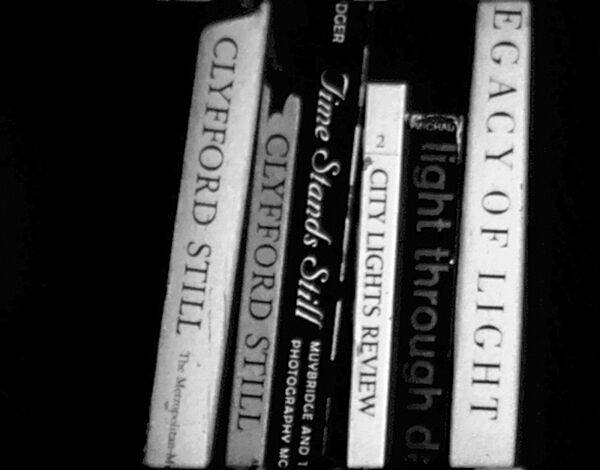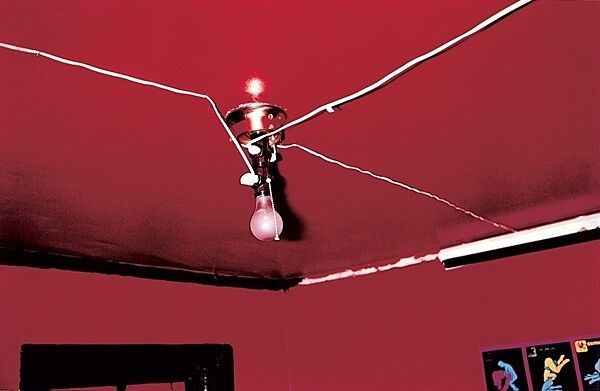Between the Still and Moving Image
Oct 1, 2008–Jan 4, 2009
Between the Still and Moving Image
Still Moving
October 1–November 2, 2008
Photography is part of the DNA of cinema. This exhibition examines the relationship between the still and moving image by artists and filmmakers whose works use stillness, slowness, light, cinematographic composition, and movement to construct different perceptions of time. Some works engage with place, extending our perception of time into the physical space of the gallery. Others draw our attention to everyday objects rendered almost three-dimensional by the camera's unmoving eye. The still photograph is the explicit subject of several works: collaged, held in front of the camera, or placed on a hot plate and left to burn as the image slowly disappears before our eyes.
William Eggleston on Film
November 5, 2008–January 4, 2009
While William Eggleston is best known for his still photography, particularly his color work of the 1960s and 70s, Eggleston also experimented with video. Eggleston's Stranded in Canton (c. 1973–74) is a home-movie portrait of friends and acquaintances in the South, shot in bars, juke joints, and roadside diners. The Whitney presents a feature-length cut of this video along with three recent documentary films about Eggleston's work and life: William Eggleston in the Real World, by Michael Almereyda, William Eggleston: Photographer, by Reiner Holzemer, and By the Ways: A Journey with William Eggleston, by Vincent Gérard and Cédric Laty.
Works in the exhibition
Babette Mangolte, The Camera: Je or La Camera: I, I977
16mm film transferred to video, black-and-white and color, sound; 88 minutes
Babette Mangolte (b. 1941) is a filmmaker and photographer, whose documentary recordings of performances by avant-garde artists and dancers such as Yvonne Rainer, Trisha Brown, Robert Morris, Robert Wilson, Simone Forti, and Lucinda Childs are considered classic works of the 1970s.
Mangolte's film The Camera: Je or La Camera I (1977) examines the power relations inherent in the construction of both still and moving images, folding one medium inside the other. Mangolte constructs a narrative around her taking photographs of a series of models as she instructs them how to pose. We watch as the models, more accustomed to the still camera, become increasingly self-conscious on film, evoking a sense of empathy and anxiety in the viewer.
Andrew Lampert, Varieties of Slow, 2008
Triple-projection film and performance
Andrew Lampert (b. 1976) is a New York-based filmmaker, whose work often includes aspects of installation art and performance. Varieties of Slow, a three-screen 16mm film installation, constructs a framework of time that operates in direct opposition to conventional "cinema time."
In this installation, each screen shows the same film projected at a different speed–sixteen, eighteen, and twenty-four frames per second. At certain moments during the day, the projectionist makes interventions--changing the lenses, covering them with colored gels, or even moving the projectors’ position within the space--that further alter our perception of the work.
Time and Place
Time and Place features films in which the camera explores the city. Some focus on New York—Times Square, the meatpacking district, and Mulberry Street in the Lower East Side; in one film, the cracks in the sidewalk become the primary subject. A fixed camera records a silent street in Lodz, Poland and a flea market in East Berlin is captured just after the fall of the Berlin Wall.
Rudy Burckhardt, What Mozart Saw on Mulberry Street, 1956
16mm film, black-and-white, sound; 6 minutes
Rudy Burckhardt, Square Times, 1967
16mm film, color, sound; 6:30 minutes
Ernie Gehr, This Side of Paradise, 1991
16mm film, black-and-white, silent; 14 minutes
Marie Menken, Sidewalks, 1966
16mm film, black-and-white, silent; 6:30 minutes
Christine Noll Brinckman, The West Village Meat Market, 1979
16mm film, color, silent; 11:30 minutes
Peter Hutton, Lodz Symphony, 1991-93
16mm film, black-and-white, silent; 20 minutes
Peter Gidal, Room Film 1973, 1973
16mm film, color, silent; 54 minutes
*The Photograph; The Camera; The Frame; The Film Strip*
In this group of films, the photograph becomes the subject: the frame is revealed as a central element in defining the boundary between stillness and movement and the composition of the film strip--a series of still images printed onto celluloid--is made explicit through re-photography.
Michael Snow, Side Seat Paintings Slides Sound Film, 1970
16mm film, color, sound; 20 minutes
Morgan Fisher, Production Stills, 1970
16mm film, black-and-white, sound; 11 minutes
Michael Snow, One Second in Montreal, 1969
16mm film, black-and-white, sound; 26 minutes
Babette Mangolte, The Camera: Je or La Camera: I, I977
16mm film transferred to video, color, sound; 88 minutes
Peter Gidal, Heads, 1969
16mm film, black-and-white, silent; 34 minutes
Hollis Frampton, Nostalgia (Hapax Legomena I), 1973
16mm film, black-and-white, sound; 36 minutes
Nancy Graves, Isy Boukir, 1971
16mm film transferred to video, color, sound; 16 minutes
Bill Brand, Moment, 1972
16mm film, black-and-white, sound; 23:30 minutes
Paul Sharits, Brancusi’s Sculpture Ensemble at Tirgu Jiu, 1977-84
16mm film, color, sound; 21 minutes
Time and Light
Peter Gidal, 4th Wall, 1978
16mm film, color, silent; 38:25 minutes
Larry Gottheim, Barn Rushes, 1971
16mm film, color, silent; 36 minutes
Larry Gottheim, Fog Line, 1970
16mm film, color, silent; 11 minutes
William Eggleston, Stranded in Canton, 1974/2005, 76 minutes
Michael Almereyda, William Eggleston in the Real World, 2005, 84 minutes
Reiner Holzemer, William Eggleston: Photographer, 2007, 26 minutes
Vincent Gérard and Cédric Laty, By the Ways: A Journey with William Eggleston, 2005, 85 minutes


